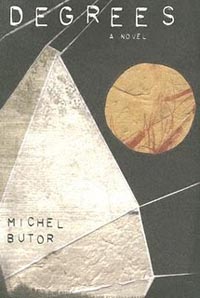An excellent interview with Ben Lerner by Tao Lin is an online exclusive at the Believer.
What writers do you think are the best, or really good at all, at dialogue? And in what way?
Degrees by Michel Butor (Part 2)
 Degrees
Degrees
by Michel Butor
Trans. Richard Howard
Originally published: Simon and Schuster, 1961
Reprint currently available from Dalkey Archive Press, 2005
351 pages / $13.95 Buy from Dalkey Archive
[Read Part 1 of this review here]
“I should like to be able to restore to your memory this moment, this hour which is already so far in the past for me that, despite the attention I was paying to you, to your whole class, I am capable of recovering with certainty which gestures you might have made, at which moments you were listening, at which you were distracted.
To help you realize what you yourself have been, in other words, where you come from, in other words where you are going—what is the vector of your present—I must already make a great imaginative effort of reconstruction, I must put myself in your place, try to see myself through your eyes and consequently let you speak, thereby destroying the equilibrium of this narrative.” (104) READ MORE >
August 22nd, 2011 / 12:00 pm
50 Endings: Hemingway
Rinaldi was a disappointing audience.
Yes.
I got a lot of use for that arm.
After a while I went out and left the hospital and walked back to the hotel in the rain.
In the morning there was a big wind blowing and the waves were running high up on the beach and he was awake a long time before he remembered that his heart was broken.
“I feel fine,” she said. “There’s nothing wrong with me. I feel fine.”
But they could not help his fear because he was up against an older magic now.
First there were birds, then me, then the Greeks, and even the birds got more out of her than I did.
“We’ll have to go,” Nick said. “I can see we’ll have to go.”
Looking back from the mounting grade before the track curved into the hills he could see the firelight in the clearing.
Then he was dead.
When they fired the first volley he was sitting down in the water with his head on his knees.
A short time after he contracted gonorrhea from a sales girl in a loop department store while riding in a taxicab through Lincoln Park.
It was a good thing to have in reserve.
Saturday Afternoon Links Because Rain Threatens
Robert Lipsyte wrote for the New York Times that boys aren’t reading. The Rejectionist neatly sums up everything that’s troubling about Lipsyte’s piece.
At the Los Angeles Review of Books, Emily Green writes about how her work was plagiarized.
Anna Clark wrote a lovely essay about writing, necessity, heat, performing the role of writer and more.
That essay was inspired by this week’s Dear Sugar which is also well worth the read. That column is always worth reading.
White Readers Meet Black Authors has a list of fall releases including Percival Everett.
Maud Newton offers a really interesting take on how DFW has stylistically influenced the way we argue on the Internet, and not for the better.
Fuckscapes by Sean Kilpatrick is available for pre-order from Blue Square Press.
My favorite new Tumblr is Fashion It So which takes a close look at the beautiful fashions of Star Trek: TNG.
Call For Anonymous Reviews

HTMLGiant is currently seeking anonymous reviews: 300-500 word reviews featuring a rating from 0.0-10.0, which can be sent to brooks [at] htmlgiant [dot] com. The new review section (containing longer formal reviews as well as shorter anonymous ones) can be perused here. Anonymous pieces published to date include reviews of Percival Everett, James Franco, Elizabeth J. Colen, John Jodzio, Tim Jones-Yelvington, Sean Lovelace, and Mary Miller. We consider reviews of forthcoming, new, or old books from small or large presses. Writing a review anonymously can induce euphoria, eliminate stage fright, indulge your adventurous nature, allow for uncensored expression, protect against the burning of bridges in the literary community, enable a new approach to creating a text, etc. HTMLGiant will not divulge its sources.
The Smooth Surface of Idyll
Happiness is not a popular subject in literary fiction, mostly because I think we struggle, as writers, to make happiness, contentment, satisfaction, interesting. Perfection often lacks texture. What do we say about that smooth surface of idyll? How do we find something to hold on to? Or, perhaps, we fail to see how happiness can have texture and complexity so we write about unhappiness. That is easier or for me, or at least seems easier. I am probably too comfortable going there, wallowing in this idea of darkness, suffering, unhappiness. Misery loves company. We are unhappy together.
I have been thinking about happy endings. I am always thinking about happy endings. I am always thinking about happiness.
Degrees by Michel Butor (Part 1)
 Degrees
Degrees
by Michel Butor
Trans. Richard Howard
Originally published: Simon and Schuster, 1961
Reprint currently available from Dalkey Archive Press, 2005
351 pages / $13.95 Buy from Dalkey Archive
It is painful to report as much, especially here at the outset of this review, one of whose ostensible purposes is to attract readers to a classic of first-generation French postmodernism, a nouveau roman that was for many years unavailable in English and, even when it was, was not widely discussed. Yet it necessary to reveal that this is a novel [1] concerned with writers and writing. Its main character / protagonist / hero / narrator is a writer, and every dramatic action in the book both originates and terminates in “the literary.” The aesthetic, social and moral quandaries all authors face are accorded some reflection in its pages, and, with the turn of each page, the novel grows in self-consciousness, as if such awareness-of-being-aware could accumulate in measurable deposits, like the nacre in a pearl. And make no mistake: objects matter in the world created by this novel. For this novel proposes to be a manuscript, and a rescued one at that; this manuscript’s (re-)assembly in the form (one both ideal and literal) of a book is not just a plot point which the reader is asked to mark, a scope through which the reader is to track and focus the novel’s action. The making of this particular book (that is, the manuscript “within” the novel) is something only we, as disinterested yet absorbed readers, can achieve. We aren’t just reading pages, reading in the sense of digesting them. A page of this book, once read, is much like a page once it has been written upon. It grows in thickness under the influence of our attention, just as it must have swelled with ink and sweat and the pressure of the author’s hand as it was being composed. Each page thus acquires a distinct texture and profile, and can be stacked, will lay flat, but each page lends its own disarray to the sequence of pages being so collected. Each page will lay less “true” than it did when it was only blank, and the array of pages each reader puts aside (or places behind him/herself) rests disjointed and askew.
August 19th, 2011 / 12:00 pm
“My momma always said I got a head shaped like a heart. Not like them cartoon hearts bitch girls draw about other boys in their notebooks. Like the real thing. A pumping chambered ugly of a muscle not meant for no light of day. Guess that means instead of brains I’m all blood. Guess that’s why I ain’t ever been scared of blood. It’s warm like I’m warm. It pools thick and gorgeous and don’t step in it less you want to make a painting of what you done for any passing bitch to start hollering about.” — from “Heart,” a great new Lindsay Hunter short in Burrow Press’s “15 Views of Orlando” project


